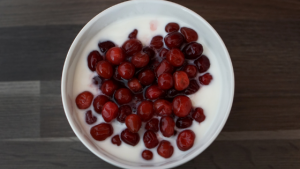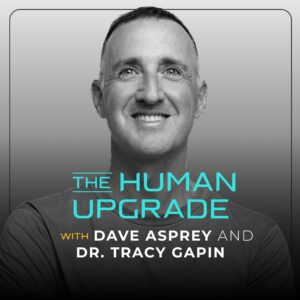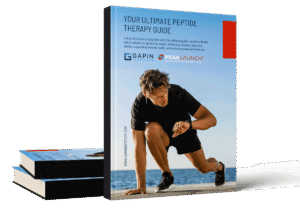
Hippocrates said, “all disease begins in the gut”—and he wasn’t wrong! Today I’m here to tell you how you can regulate your overall health by consuming tiny, living organisms: probiotics.
You’ve hit age 40, 50, or 60… and are noticing that your health isn’t what it used to be. Your belly is growing, you have new aches and pains, and you get sick easier than you used to. You take over-the-counter meds, prescription meds, supplements, this and that… and still nothing seems to be helping your health.
That’s because those medications simply mask your specific symptoms without getting to root of the problem.
For example, you may notice that after age 40 you’ve started getting sick more often. You take cold medication and amoxicillin when it strikes, and you might even take Airborne or vitamin C to help prevent it. But still, your immune system is down. Without a major system overload, you will continue to get sick time and time again because your immune system isn’t functioning properly.
So how do you know what the real problem is? And how do you fix it?
It may not be as complicated as we think. Recent research shows that overall well-being is linked to the gut. That means that oftentimes those inexplicable ailments in your body relate back to your intestinal system (stomach and colon).
In fact, many scientists and researchers even call the gut “the body’s second brain.” The gut sends signals and nutrients to the rest of your body, telling your brain, organs, and even blood how to work.
What does a healthy gut look like?
85% of good bacteria and 15% of bad bacteria make up a healthy gut. This good bacteria helps keep the rest of your body functioning by helping to absorb nutrients, support the immune system, balance hormones, and keep your organs clear of disease. The good bacteria also help fight off bad bacteria, like disease and infection. Research with Harvard Health discovered that good bacteria can actually prevent and treat common diseases.
Every day, we encounter environmental stressors that can deplete the good bacteria and allow bad bacteria to take over. Unhealthy or processed foods, pollution, antibiotics, pesticides, and even simple aging processes can create a disharmonious relationship between good and bad bacteria. Sickness seeps in as the ratio of good bacteria to bad bacteria becomes unbalanced.
In fact, a study in Neurogastroenterology & Motility found that mice who had higher levels of bad gut bacteria were more likely to engage in high-risk behavior. They also found that their gut bacteria neurochemically altered brain gene activity and organ functioning.

Gut health directly relates to mental and physical health. So how do we keep the gut healthy and the good bacteria at an advantage?
Probiotics.
What are probiotics?
Probiotics are live organisms that add good bacteria to your gut. “Pro” means both “an advantage of something” and “before”; and “biotic” relates to living things and the relation to their ecosystem. Together, this gives us an understanding of probiotics:
Probiotics are living microbes that give our gut an advantage before bad bacteria strikes.
There are multiple strains of probiotics, but the most common are Bifidobacterium longum and Lactobacillus acidophilus.
Probiotics are well known for their influence on digestion, IBS, lactose intolerance, and other intestinal-related issues. But recent research has found that probiotics may also have a lot of other benefits for overall health outside of the gut as well:
- Reduce inflammation
- Reduce bloating/gas
- Improve digestion and constipation
- Balance hormones
- Regulate blood sugar levels
- Promote nutrient absorption
- Boost immune system
- Fight off disease, infection, and the common cold
In fact, probiotics help stave off signs of aging in your body by promoting healthy, youthful organ processes. Many people may struggle with a lot of the factors listed above and below and it may prove to be damaging to their confidence as well as their health. That's why Probiotics such as these probaclac probiotics can help with some of these issues and can help give you a better quality of life. Probiotics may also be beneficial in fighting off age-related concerns like:
- Weight gain
- Cholesterol and cardiovascular illnesses
- Mood disorders and stress
- Lowered immunity (more susceptible to illness)
- New or worsened allergies
- Sagging, wrinkled, uneven skin
- Diminished bone mass
- Harsher medication side effects
- Worsened colon diseases
- More stomach acid and ulcers
Let’s take a look at the research to back up these pro-probiotic claims:
1. Promotes weight loss
Everyone naturally gains weight as they age. After age 40, your metabolism drops and it feels like every fry goes right to the gut. In addition, your testosterone levels drop with age—and low T is linked to increased weight gain.
A slow metabolism, low testosterone levels, and low energy all contribute to that growing number on the scale. You may also feel as though no matter what you do, you can’t seem to shed those increasing pounds. Probiotics may be the solution to kick-start your weight loss program.
Probiotics have been shown to reduce body weight and BMI, according to a meta-analysis published in the International Journal of Food Sciences and Nutrition. They found that ingesting at least two types of probiotics for 8 weeks had the greatest weight loss results. The weight loss was not drastic, so probiotics are not the same as a “weight loss pill.”
Nevertheless, the researchers concluded that probiotics can be a useful addition to a healthy diet and exercise plan as a way to boost weight loss results and encourage a healthful lifestyle. Another study found that the probiotics rhamnosus and bifidobacterium lactis proved especially beneficial in preventing obesity and boosting weight loss.
Even a small reduction in weight due to probiotics can encourage you to pursue a weight loss plan that will lead to overall health and wellness.

One form of probiotics, lactobacillus gasseri, was found to result in a loss of 8.5% belly fat mass over a 3-month period on average. While these results from the British Journal of Nutrition were strong, there was also a strongly opposing caveat. The moment the participants stopped taking the supplement, they gained back all of that weight.
This shows that certain strains of probiotics may help you shed those pounds—but they are not a solution in it of themselves.
Additionally, probiotics have been proven time and time again to help regulate blood sugar. After you eat, your blood sugar spikes. When those spikes are strong enough, your body takes the extra sugar and turns it into fat. Probiotics regulate those spikes, so your body won’t have a lot of free-floating sugar to convert to fat cells.
This means that probiotics may also help individuals with type 2 diabetes.
2. Lowers cholesterol
Probiotics have been linked to cholesterol regulation and heart health. The 2010 Journal of Cardiovascular Disease Research found three ways that probiotics lower cholesterol levels:
a.) Probiotics produce propionic acid.
This acid sends signals to the liver and tells it to produce less cholesterol.
b.) Probiotics break down liver bile acids.
Bile is a byproduct of the liver’s consumption of cholesterol. As probiotics break down bile acids, the liver is forced to produce more bile. This means that the liver needs to use up more cholesterol in order to make that additional bile. This helps naturally lower the cholesterol because your liver is using up cholesterol for its natural processes.
c.) Probiotics actually eat cholesterol and use it as nourishment. Nice!
A 2012 study in Experimental Diabetes Research furthered this theory with proof of certain probiotic strains’ effect on cholesterol. For example, L. reuteri lowered triglycerides, L. acidophilus ate cholesterol, and L. plantarum used cholesterol assimilation to rid of unhealthy cholesterol levels.
Basically, probiotics eat cholesterol, force your liver to produce less cholesterol, and cause your liver to consume its own cholesterol. A triple threat.
3. Improves mood disorders
One of the most surprising and exciting benefits of probiotics is the impact on the brain and nervous system, again reiterating the strong link between gut and overall wellbeing.
After age 40, life hits harder than in the past. External stresses and anxieties pop up, and our body loses energy and strength to deal with these stressors. Probiotics may help keep up our energy and fight off mood disorders, making probiotic users happier and healthier overall.
A Gastroenterology study of mice found that gut flora (aka the amount of good or bad bacteria in the tummy) directly influenced mice behavior and brain chemistry—aside from any external factors. The researchers believe that the bacteria produces some sort of chemical that can influence the brain…meaning that probiotics can help correct mood changes.
This may prove especially true for those who have gastrointestinal diseases or an unhealthy amount of bad gut flora already.
A small Brain, Behavior, and Immunity study found that “multispecies probiotic supplementation reduced cognitive reactivity to sad mood.” Those participants who took a probiotic supplement daily felt happier than those who were taking a placebo. They found the strongest effects with regards to reduced rumination (thinking about sad things) and reduced aggressiveness.
This suggests that probiotics can be a potential preventative strategy for depression, stress, and anxiety.
The Gut Microbes study discovered that two strains of probiotics, L. helveticus and B. longum, had especially strong psychological effects and were best able to reduce symptoms of anxiety and depression.
Additional research has found that bacteria can signal the brain to better deal with “stressors,” so stress doesn’t negatively influence the rest of the body.

But here’s my favorite study on the link between gut bacteria and psychological health:
Research published in Psychopharmacology found that participants taking prebiotics (similar to probiotics) paid less attention to negative stimuli and more attention to positive ones. Those individuals also had less anxiety with regards to negative or threatening stimuli.
But more importantly, those with prebiotics and high levels of good bacteria also had lower levels of cortisol when they woke in the morning (compared to participants taking a placebo). High levels of cortisol has a direct impact on depression.
High cortisol is also related to low testosterone. Cortisol suppresses testosterone production. This means that if you’re depressed or stressed, you get a spike in cortisol and a drop in testosterone. This can lead to low T levels and all the symptoms that come with it, like weight gain (see #1), loss of energy, and low sex drive.
This creates a vicious cycle of depression, anxiety, low testosterone, weight gain, and more. Probiotics may be able to help intervene and reduce cortisol, giving you better control over your moods, your testosterone, your weight, and your energy.
4. Boosts immune health
In the same way that the gut can influence the nervous system, it also influences the immune system. Immunity naturally decreases with age, and it can be hard to re-boost it unless you drown yourself in vitamin C.
A study in Nutrients found that athletes showed less incidence of upper respiratory infection when using probiotics. Another study by Yan and Polk found that probiotics may regulate the functions of immune cells, showing “therapeutic potential for diseases.” In essence, these studies suggest that probiotics are linked to the body’s overall immune-response system when faced with disease and infection.
Antibiotics go in to fight disease and bad bacteria after it’s hit. Probiotics fight off the bad bacteria before disease gets the chance to hit. Having a healthy level of good bacteria and probiotics in the gut can help ward off illness before it strikes. (Hence the prefix “pro”.)
If you keep your gut healthy, you’ll keep your entire body healthy.

5. Minimizes allergies
A study published in the European Journal of Clinical Nutrition found that the probiotic B. lactis was able to boost the immune system and lower levels of pro-inflammatory markers. This helped those individuals suffering from seasonal allergies, concluding that B. lactis and other forms of probiotics may be useful for managing respiratory allergies.
If you are struggling with allergies and over-the-counter meds aren’t doing the trick, probiotics are a healthy potential alternative.
6. Improves skin conditions
Probiotics have anti-inflammatory effects throughout the body—including minimizing inflammation in your largest organ, your skin. Studies suggest that there is a link between probiotics and the treatment of psoriasis, eczema, rosacea, and even stubborn adult acne.
Additionally, long-term inflammation is a major cause of wrinkles. Minimize this inflammation with probiotics and restore your face with lots of water… and you’ll be able to fight off signs of aging. Some researchers believe that probiotics also help build collagen; collagen is what keeps your skin youthful and wickedly handsome.
These results aren’t totally proven yet, but we know probiotics won’t make you look older—so give it a shot!
7. Maintains bone density
Age brings with it a loss of bone mass and density. Bone breaks and cracks become easier and more frequent—and also more life-threatening. This is especially true for men with low testosterone levels, as high estrogen levels can take over and deteriorate bones.
According to the National Osteoporosis Foundation, 1 in 4 men over age 50 will break a bone because of bone density loss.
You can protect your bone density with probiotics! Studies have confirmed that “probiotics can increase bone mass density and bone mineral content and help reduce osteoporosis.”
P.S. Did you know that milk doesn’t actually make your bones stronger? “Got Milk” is one of the largest fibs of our modern media! Probiotics are the most natural way to maintain your bone’ strength and durability.
8. Minimizes diarrhea side effects
Unfortunately, a lowered immune system also leads to other diseases and problems that call for medications. A 2012 study found that probiotics may improve symptoms of diarrhea associated with chemotherapy and antibiotic usage.
In addition, the British Journal of Cancer found that those participants who were treated with two strains of probiotics (5-fluorouracil and L. rhamnosus) experienced less severe diarrhea and shorter hospital stays than those patients not taking probiotics. This was especially true for participants who were undergoing chemo for colorectal cancer, likely because probiotics can have other positive effects on the large intestine.
9. Treats diverticular diseases
Probiotics are well known for their ability to aid in digestion and stomach disorders—but they may have even stronger effects on the intestines than previously considered.
Diverticulitis and diverticulosis are much more common after the age of 40, and diverticulosis is one of the most common medical conditions in the U.S. with nearly one-third of all Americans developing it by age 60—and two-thirds by age 85. But just because it’s common doesn’t mean it shouldn’t be taken seriously. In fact, the pain is so intense it often causes hospital stays, and serious cases can call for emergency surgery and long-term health concerns.
But diverticular disease is preventable and treatable. Multiple analyses and studies have shown that probiotics can help prevent diverticular disease by improving digestion and bowel movements. Less poop in your system, the less likely you’ll develop diverticular disease—and the more energy and vigor you’ll have! These studies also showed that probiotics can help treat symptomatic diverticular disease, prevent disease recurrence, and improve quality of life.
One study found that the probiotic L. casei was an especially effective treatment—as effective as the standard medication for diverticulosis. Plus, the probiotics had fewer side effects. A combination of probiotics with prescription medications showed the fastest and most complete recovery.
10. Eradicates ulcers

Similarly, ulcers become a common occurrence with age. Acid builds up over the years (especially when processed foods are consumed), and the stomach doesn’t have the youth and vigor to handle the imbalance of acid. This causes the stomach to eat itself, causing painful and dangerous ulcers and internal bleeding.
Probiotics have been shown to eradicate ulcers and restore the gut’s natural balance. Probiotics attack and eat Helicobacter pylori, a bacteria linked to the development of ulcers. This stops ulcers in their tracks before they even begin to form.
Probiotics thus can reduce peptic ulcers, gastritis, and other stomach atrophies.
Where can you find probiotics?
Have I convinced you of the importance of probiotics in your aging health? Great! So how can you get the probiotics your body so desperately craves?
You can naturally find probiotics in fermented foods such as:
- Yogurt
- Kimchi
- Soft, fermented cheeses
- Unpasteurized sauerkraut
- Miso soup
- Sourdough bread
- Sour pickles (naturally fermented)
- Kombucha
- Kefir (fermented milk drink)

These delicious foods are an easy addition to your diet. I always recommend eating at least one cup of Greek yogurt per day. It’s a healthy snack that will give you your daily dose of probiotics while also helping to slim down your waistline, curb hunger cravings, improve mental clarity, and more.
The unfortunate paradox of probiotic-rich foods is that many of them are lactose-happy. If you are lactose intolerant or sensitive, you should not eat many of these foods. Nevertheless, you especially need probiotics to help overcome your IBS and lactose intolerance problems.
Thankfully, probiotic supplements are easy to come by. You can buy a variety of probiotic strains at your local health grocer, supplement store, or drug store. Taking the daily dose of these supplements will ensure you regulate your gut flora towards overall healthier wellbeing—no matter your age.
Always be sure to consult with your doctor before starting a new regimen. Your doc can help find the best natural probiotic solutions for your health concerns.
Do you want to learn more about ways to boost your health? Sign up for Peak Launch Program now.








